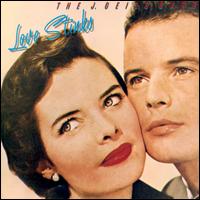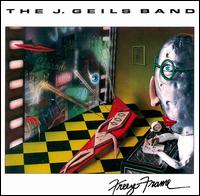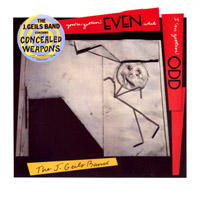
 I had originally set out to write an entry into our series Call It A Comeback, and it was to be about the J. Geils Band. The problem with that is there really wasn’t much of a comeback to speak of. Many people knew about the band’s ’70s output and some of their rock radio hits from that time period, and by that accounting the “Bad Boys of Boston” were doing pretty well. Let’s get real though — unless you were already fans of the band, their Atlantic Records output was usually something you flipped past in the record racks on the way to something else.
I had originally set out to write an entry into our series Call It A Comeback, and it was to be about the J. Geils Band. The problem with that is there really wasn’t much of a comeback to speak of. Many people knew about the band’s ’70s output and some of their rock radio hits from that time period, and by that accounting the “Bad Boys of Boston” were doing pretty well. Let’s get real though — unless you were already fans of the band, their Atlantic Records output was usually something you flipped past in the record racks on the way to something else.
That stuff, starting with 1970’s The J. Geils Band and closing with 1977’s Monkey Island, had a distinctive blues-r&b flavor but also had a jovial, freewheeling touch to identify itself with. The band was less a hardcore soul-rock outfit than were, say, The Blues Brothers or The Commitments. They were a bunch of white fellows that deeply loved this authentic sound but were, just as equally, the original party rockers (sorry, LMFAO). They could swing it and bring it, but they were goofy too, and would possibly have played for a keg of beer as readily as for straight pay.
The two primary elements of their sound during this period came from the guitar of the band’s namesake, (John) Geils and harmonica player Richard “Magic Dick” Salwitz. You can hear Magic Dick knock it out of the park on a cover of “Whammer Jammer” from the 1971 record The Morning After. Geils was also recognized as a pretty hot guitar-player, and yet neither member seemed as essential to what would become the group’s biggest period; the “comeback” that essentially wasn’t. After a decade of solid work and middling achievement, they finally came into their own but didn’t sound quite like the band of old.
(Ain’t Nothin’ But A) House Party
It is thanks mostly to vocalist Peter Wolf and keyboardist Seth Justman, the latter of the two becoming the most integral to their success with a large hand in the writing of their poppier material, and an array of synth-keys that would become more and more predominant in their sound. Yet the opening salvo of this new attitude came with Geils in full stomp-mode on the title track of 1980’s Love Stinks, only their second release from new label EMI. Though more lighthearted and accessible, there is not much distance between the song and AC/DC’s “Back In Black,” another guitar stomp of the times. The pivot point comes from Justman’s keys, a leavener for what is arguably the group’s heaviest-sounding moment. And who of a certain demographic has not (in a fit of insouciance or baldfaced jiltedness) wanted to blast the tune out very loudly? “I’ve been through diamonds, I’ve been through minks, I’ve been through it all!,” Wolf rants, bringing it down with a pissy groan, “Love stinks.”
Overall, that is the song people most remember from the record and probably little else, but it was enough to reshape what they expected from the band. Certain aspects of old remained. They were still party rock and they still liked blues and soul, but they deferred it to get the recognition they needed. Some might say it was a sell-out and others might call it an act of survival. It depends on how you felt about the band prior to their transformation. “Love Stinks” wasn’t a #1 pop chart hit but brought The J. Geils Band back to the attention of rock radio which had been casually overlooking them later in the Seventies. They wouldn’t be so easily denied with their next entry.
Desire (Please Don’t Turn Away)
 With EMI now secure that their acquisition of the band was not a mistake, they must have had some influence in keeping what had begun going: build up what worked on Love Stinks, scale back what were the more traditional aspects, and make a monster. That monster was 1981’s Freeze Frame. It sported two hits, the title cut and a song that is so of-it’s-time that it probably has made itself impossible to be covered with a straight face. That song was “Centerfold.” In it, Wolf seethes about realizing his high school sweetheart has decided to pose for the centerfold of a naughty magazine. He found out about it by looking through that naughty magazine, by the way, and the crux of his angst is that the whole world was getting a good hard look at his “homeroom angel” naked as the day she was born.
With EMI now secure that their acquisition of the band was not a mistake, they must have had some influence in keeping what had begun going: build up what worked on Love Stinks, scale back what were the more traditional aspects, and make a monster. That monster was 1981’s Freeze Frame. It sported two hits, the title cut and a song that is so of-it’s-time that it probably has made itself impossible to be covered with a straight face. That song was “Centerfold.” In it, Wolf seethes about realizing his high school sweetheart has decided to pose for the centerfold of a naughty magazine. He found out about it by looking through that naughty magazine, by the way, and the crux of his angst is that the whole world was getting a good hard look at his “homeroom angel” naked as the day she was born.
The song is a fun track, tied up with a whistle-coda and filled all over with Justman’s keyboards. It is also a fairly sexist sentiment that runs through the lyrics. The guy in the song is mad that not just somebody, but anybody, could now see his old high school flame exposed, as if she should have been forced to wear four layers of clothing for the rest of her days after their backseat fidaddle. His solution to this conundrum is to seek out the young, comely lass and hook up with her again, which has all the romantic implications of a house cat that drank too much milk setting out to mark its territory. Another thing that firmly sets the track in the early-1980s is the framing device of the magazine. In the digital age, going to a newsstand to gawk at Playboy Magazine seems almost quaint. These drag down the songs when you think about them too much, and luckily for the band, you don’t. They remain fun, often funny, little bits of pop — misogynist though they might be.
Now understand that when the song, omnipresent upon it’s release, actually came out I would have been twelve years old. You may have been also, and possibly younger, so let us dismiss this idea that our children are listening to the most degraded, amoral garbage ever recorded right now. We listened to a song about a dude who checked out a magazine, ostensibly with which to get his jollies, only to find he knew the model inside, and his first instinct is to go get some of that and assert his dominance over her sexy little bod — and we loved the song enough to make it a huge hit. Moralizing over what R-rated thing Rihanna just sang loses a lot of its power now, doesn’t it?
An aside — during their promotional jaunt for Freeze Frame, the band appeared on The Joe Franklin Show, a late-night show featuring the affable, if somewhat stodgy, host that is probably more recognized for the impression Billy Crystal used to do of him on Saturday Night Live. Franklin was more likely to have as guests old school Broadway stars, crooners, Bobby Short on piano, for Pete’s sake. He didn’t have stage room for bands to perform and he didn’t seem to have much interest for bands to begin with, and yet there they were, sitting on his tiny brown couch, wearing the overalls they wore in the “Freeze Frame” video. It was surreal and kind of awesome all at once, mostly because Franklin in his best “showbiz is awesome” work ethic hadn’t a clue what the hell was going on right there. I don’t think the band knew for sure either. Cringe TV at it’s most glorious, without a doubt. I don’t remember if Franklin referred to Magic Dick by name.
Another thing that survived the band’s changeover was their inherent goofiness, on Love Stinks‘ spoken-word “No Anchovies Please” and Freeze Frame‘s closing “Piss On The Wall.” What wasn’t getting as much love was the harmonica work of Magic Dick, who gets two standout moments on Freeze Frame and is relegated mostly to background color thereafter: “Rage In The Cage” and the album’s best offering, “Flamethrower,” a tune that is absolutely begging for a cover from Prince. My favorite track from Love Stinks, on the other hand, hearkens back to a bluesier side, being the ballad “Desire (Please Don’t Turn Away).” I mention these tracks particularly because the J. Geils Band’s “comeback” was coming to a close whether they knew it or not. It would come with an album that sounds the least like anything they had done before.
 Getting the bulk of the attention, Peter Wolf went solo and had a hit with the song “Lights Out.” Justman took control of the band as frontman and, from that, we got You’re Gettin’ Even While I’m Gettin’ Odd. While he may not have been the most technically proficient vocalist, Wolf had charisma and attitude, both carrying him through whichever song he was singing. In contrast, Justman sounds thin and unconfident, and even if he had been a major part of bringing the J. Geils Band to prominence, he sounds uncomfortably out of place in his new position as the frontman. You’re Gettin’ Even While I’m Gettin’ Odd seemed to hang around the shops for a long time, and I can imagine the store owners saying to the indifferent customers, “But you loved this band only a couple years ago!” Maybe, but it just wasn’t the same band anymore.
Getting the bulk of the attention, Peter Wolf went solo and had a hit with the song “Lights Out.” Justman took control of the band as frontman and, from that, we got You’re Gettin’ Even While I’m Gettin’ Odd. While he may not have been the most technically proficient vocalist, Wolf had charisma and attitude, both carrying him through whichever song he was singing. In contrast, Justman sounds thin and unconfident, and even if he had been a major part of bringing the J. Geils Band to prominence, he sounds uncomfortably out of place in his new position as the frontman. You’re Gettin’ Even While I’m Gettin’ Odd seemed to hang around the shops for a long time, and I can imagine the store owners saying to the indifferent customers, “But you loved this band only a couple years ago!” Maybe, but it just wasn’t the same band anymore.
The J. Geils Band has reunited several times since then, but has never recorded another album. I’m never one to say a band shouldn’t record new material, believing part of being a functional, responsible band is being a band that continues to write and record. And yet, there is something appropriate to the group leaving things where they are now, and only on certain occasions taking out the hits and giving them a flash. They had a great run, and the second leg of the journey was more successful than the first, but times have changed. Like undressed women in a magazine, The J. Geils Band seem a piece of something from then, not of now.






Comments